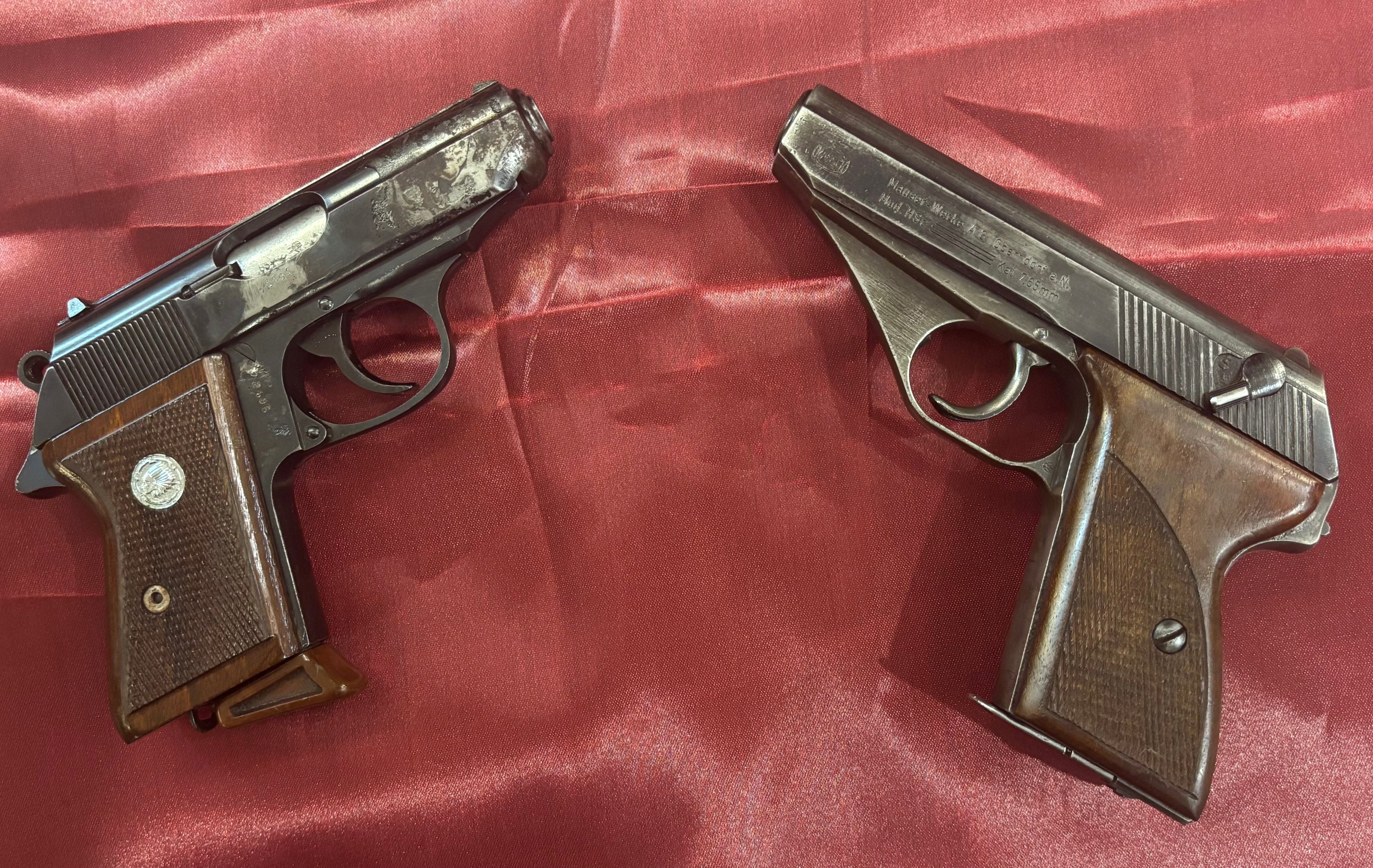
Mauser HSc & Walther PPK
This week for Firearm Friday we are spending some time looking at the Mauser HSc & Walther PPK

Mauser:

The Mauser HSc is a 7.65mm pistol introduced in Nazi Germany during World War II, and manufactured until 1977. The designation HSc stood for Hahn Selbstspanner ("self-cocking hammer") Pistole, third and final design "C". Production was continued in 1945–1946 during the French occupation and, from 1968 to 1977 by Mauser. It has a semi-exposed hammer, double-action trigger, single-column magazine, and a spring surrounding the barrel.

The Mauser HSc was originally intended as a commercial pistol. It competed with the contemporary German Walther PPK for police and military use. It was procured initially by the navy, soon followed by the Army and police. HSc pistols used by the Luftwaffe or Waffen-SS were procured from Army and police stocks.

Production began in late 1940 at serial number 700,000, as an extension of the serial number range of the Mauser Model 1934 pistol, a much more difficult pistol to manufacture. The early pistols have well-made wooden grips, and are highly polished and richly blued. The first 1350 pistols were made for the commercial market and, because of the low positioning of the grip screws. All these early low grip pistols are today very rare. At approximately serial number 701345 the grip screws were relocated upward to a more central and sturdier position.

The German Army began HSc procurement with an initial order for 3,000 pistols in early 1941, beginning with serial number 701,345. These pistols are marked with an Eagle/655 inspection stamp on the left rear trigger guard web. Subsequent orders were placed by the Army throughout the war, with further pistols procured by the Police and Kriegsmarine, and almost 24% of the total production of 252,000 pistols going to the commercial market.

The HSc pistols made by the French in 1945–1946 bear an RW proof. Most of these pistols were destined for French forces fighting in the First Indochina War.
Walther:

The Walther PP (or police pistol) series pistols are blowback-operated semi-automatic pistols, developed by the German arms manufacturer Carl Walther GmbH Sportwaffen. The Walther PP series feature an exposed hammer, a double-action trigger mechanism, a single-column magazine, and a fixed barrel that also acts as the guide rod for the recoil spring.

The most common variant is the Walther PPK, a smaller version of the PP with a shorter grip, barrel and frame, and reduced magazine capacity. A new, two-piece wrap-around grip panel construction was used to conceal the exposed back strap. The smaller size made it more concealable than the original PP and hence better suited to plain-clothes or undercover work. It was released in 1931.

"PPK" is an abbreviation for Polizeipistole Kriminal (literally "police pistol criminal"), referring to the Kriminalamt crime investigation office. While the K is often mistakenly assumed to stand for kurz (German for "short"), as the variant has a shorter barrel and frame, Walther used the name "Kriminal" in early advertising brochures and the 1937 GECO German catalog.

The fictional secret agent James Bond uses a Walther PPK in many of the novels and films. Ian Fleming's choice of Bond's weapon directly influenced the popularity and notoriety of the PPK.
Fleming had given Bond a .25 Beretta 418 pistol in early novels but switched to the PPK in Dr. No. Although referred to as a PPK in the film adaption of 1962, the actual gun carried by actor Sean Connery was a Walther PP. Actor Jack Lord, who played Felix Leiter in Dr. No, was presented with a gold-plated PPK with ivory handgrips, given to him by his friend Elvis Presley. Presley owned a silver-finish PPK, inscribed "TCB" ("taking care of business").

We have both a Mauser HSc & Walther PPK in our museum due to the restrictions on barrel length most licenced firearm holders are unable to obtain these for club use. We are more than happy to explain the production history on these firearms during a tour!.
















